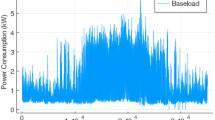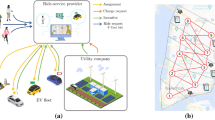Abstract
Electric vehicle charging is considered as a prime case of load flexibility in future smart grids. We examine a scenario where electric vehicles are charged in a car park with local photovoltaic (PV) generation. In this setting, temporal charging flexibility can be leveraged to increase utilization of local generation. To incentivize flexible loads we apply a deadline differentiated pricing scheme. Prices are set by the car park operator in a profit-maximizing manner in settings with varying PV capacity and costs of conventional generation. This allows us to assess the value of flexibility passed on to customers in form of discounts. Furthermore, we determine the minimum flexibility level qualifying for this discount. By and large, absolute price levels and flexibility discounts are mainly driven by the cost of conventional generation. On the other hand, the minimum flexibility requirements are affected by both the costs of conventional generation as well as the local PV capacity: higher costs of conventional generation as well as larger PV capacities will decrease this threshold.






Similar content being viewed by others
Notes
Bitar and Low note, that deadline differentiated pricing “would naturally complement the proliferation of electric vehicles in the US transportation fleet.”
Consequently, \(p_0\) denotes the energy price without flexibility, \(p_1\) for a flexibility of 15 min, and \(p_n\) for a flexibility of \(n\times 15\) min.
This is done for reasons of practical applicability as well as to limit computational complexity leading to a more limited price menu.
The function is defined for \(0\le x \le q_1\).
For ease of exposition, we replace \(d_{c,\bar{f_c}}\) and \(\delta _{c,\bar{f_c}}\) by \(d_c\) and \(\delta _c\) from now on.
See www.goingelectric.de/stromtankstellen/ for a comprehensive listing of fast charging stations.
From MOP data we use the file “W”. Data description and codeplans are available at http://mobilitaetspanel.ifv.kit.edu/english/92.php.
The general structure of the obtained results is not affected by this concrete choice.
References
Albadi MH, El-Saadany E (2008) A summary of demand response in electricity markets. Electr Power Syst Res 78(11):1989–1996
Palensky P, Dietrich D (2011) Demand side management: demand response, intelligent energy systems, and smart loads. IEEE Trans Ind Inform 7(3):381–388
Shao S, Pipattanasomporn M, Rahman S (2011) Demand response as a load shaping tool in an intelligent grid with electric vehicles. IEEE Trans Smart Grid 2(4):624–631
Goebel C, Jacobsen H-A, Razo V, Doblander C, Rivera J, Ilg J, Flath C, Schmeck H, Weinhardt C, Pathmaperuma D, Appelrath H-J, Sonnenschein M, Lehnhoff S, Kramer O, Staake T, Fleisch E, Neumann D, Strüker J, Erek K, Zarnekow R, Ziekow H, Lässig J (2014) Energy Informatics. Bus Inf Syst Eng 6(1):25–31. doi:10.1007/s12599-013-0304-2
Bitar E, Low S (2012) Deadline differentiated pricing of deferrable electric power service. In: 2012 IEEE 51st IEEE conference on decision and control (CDC), pp 4991–4997, Dec 2012
Watson RT, Boudreau M-C, Chen AJ (2010) Information systems and environmentally sustainable development: energy informatics and new directions for the is community. Manag Inf Syst Q 34(1):23–38
Bitar E, Xu Y (2013) On incentive compatibility of deadline differentiated pricing for deferrable demand. In: Decision and control (CDC), 2013 IEEE 52nd annual conference on, 2013, pp 5620–5627
Flath CM (2013) An optimization approach for the design of time-of-use rates. IECON 2013—39th annual conference of the IEEE industrial electronics society, pp 4727–4732, Nov 2013
Eberle U, von Helmolt R (2010) Sustainable transportation based on electric vehicle concepts: a brief overview. Energy Environ Sci 3(6):689–699
Nayyar A, Negrete-Pincetic M, Poolla K, Varaiya P (2014) Duration-differentiated services in electricity. 2014. arXiv:1404.1112.
Siddiqi SN, Baughman ML (1993) Reliability differentiated real-time pricing of electricity. IEEE Trans Power Syst 8(2):548–554
Dütschke E, Paetz A-G (2013) Dynamic electricity pricing—which programs do consumers prefer? Energy Policy 59:226–234
Author information
Authors and Affiliations
Corresponding author
Additional information
3rd D-A-CH conference on Energy Informatics 2014-Zurich, Switzerland.
Rights and permissions
About this article
Cite this article
Salah, F., Flath, C.M. Deadline differentiated pricing in practice: marketing EV charging in car parks. Comput Sci Res Dev 31, 33–40 (2016). https://doi.org/10.1007/s00450-014-0293-5
Published:
Issue Date:
DOI: https://doi.org/10.1007/s00450-014-0293-5




